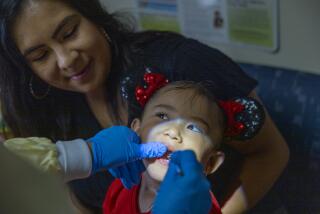Dental health tips for kids
- Share via
Good oral health in children translates to healthy adult teeth. Here’s how to help care for your child’s pearly whites:
•Take your child to a pediatric dentist by the child’s first birthday or when the first teeth arrive, whichever comes first.
•Begin helping your child floss by the time their last two molars come together, which usually happens when children are 21/2 to 3 years of age. “The minute the two last molars — the first and second baby molars — come together, flossing becomes a big way to prevent that plaque formation from taking place,” says Dr. Indru Punwani, professor and head of the department of pediatric dentistry at the University of Illinois in Chicago. “The cavities tend to start in between the teeth.”
•Don’t let children brush their own teeth until around the ages of 7 to 9 — or until they’re able to tie their shoes or cut their meat on their plates.
•Curb thumb-sucking by approximately age 5 to prevent developmental abnormalities.
•Don’t allow young children to carry around sippy cups containing anything but water.
•Cut down on sugary snacks between meals. One of the major cavity-causing culprits is eating sugary foods throughout the day, says Richard Mungo, a pediatric dentist in Huntington Beach, Calif. For example, children may start out in the morning eating a sugarcoated cereal and a piece of toast with jelly on it. Mid-morning, they might snack on graham crackers; then lunchtime rolls around and they drink chocolate milk with their peanut butter and jelly sandwich. At 3 p.m., it’s a Twinkie. “It’s the number of times you expose your teeth to the sugars that’s important, not how much [sugar],” says Mungo.
•Limit sticky foods such as raisins and fruit roll-ups, which cling to the teeth. Experts note that raisins are very nutritious, but they tend to get wedged in the teeth and stay put. Encourage children to take a sip of water after eating these and other snacks. “Swish it around, make faces with them, and help get if off the teeth,” says Mungo.
• Take care of your own oral health. Research shows that the bacteria that cause decay can be passed from caregivers to infants and young children. Rinsing with anti-bacterial mouthwashes has been shown to significantly reduce the number of cavity-causing bacteria.
•Limit the sharing of spoons and bottles between caregivers and children and among children themselves.
•Let older children chew sugar-free gum. Gum increases the flow of saliva in the mouth and helps neutralize acids on the teeth. Further, studies have suggested that chewing sugar-free gum for 20 minutes after meals can help prevent tooth decay. The ADA recommendshttps://www.ada.org/5098.aspx%3FcurrentTab=1 gum containing xylitol, a naturally occurring sugar substitute, as well as gum that has the ADA seal of approval. (NOTE: Chewing gum is considered a serious choking hazard for young children.)
—Amanda Mascarelli






